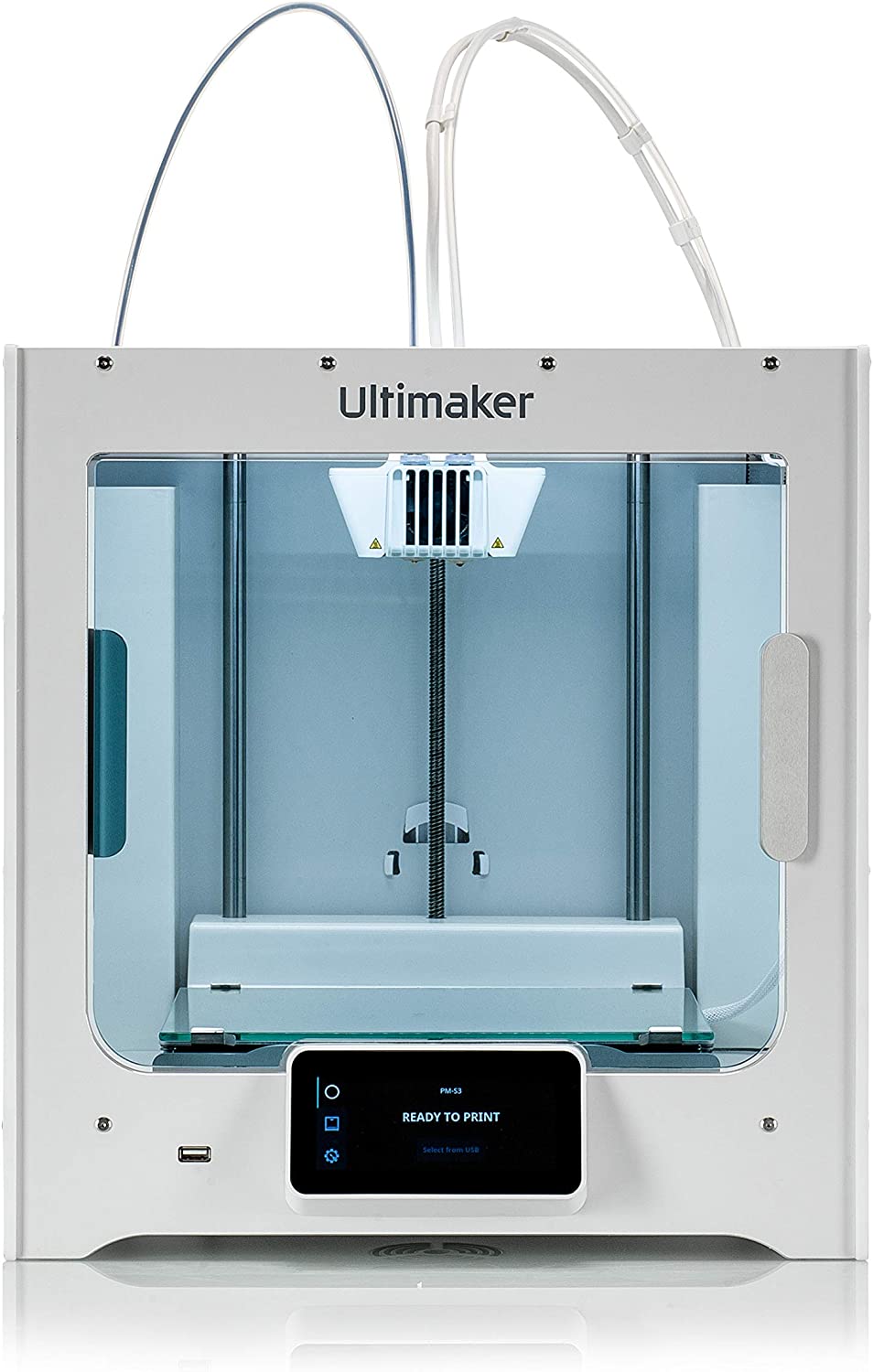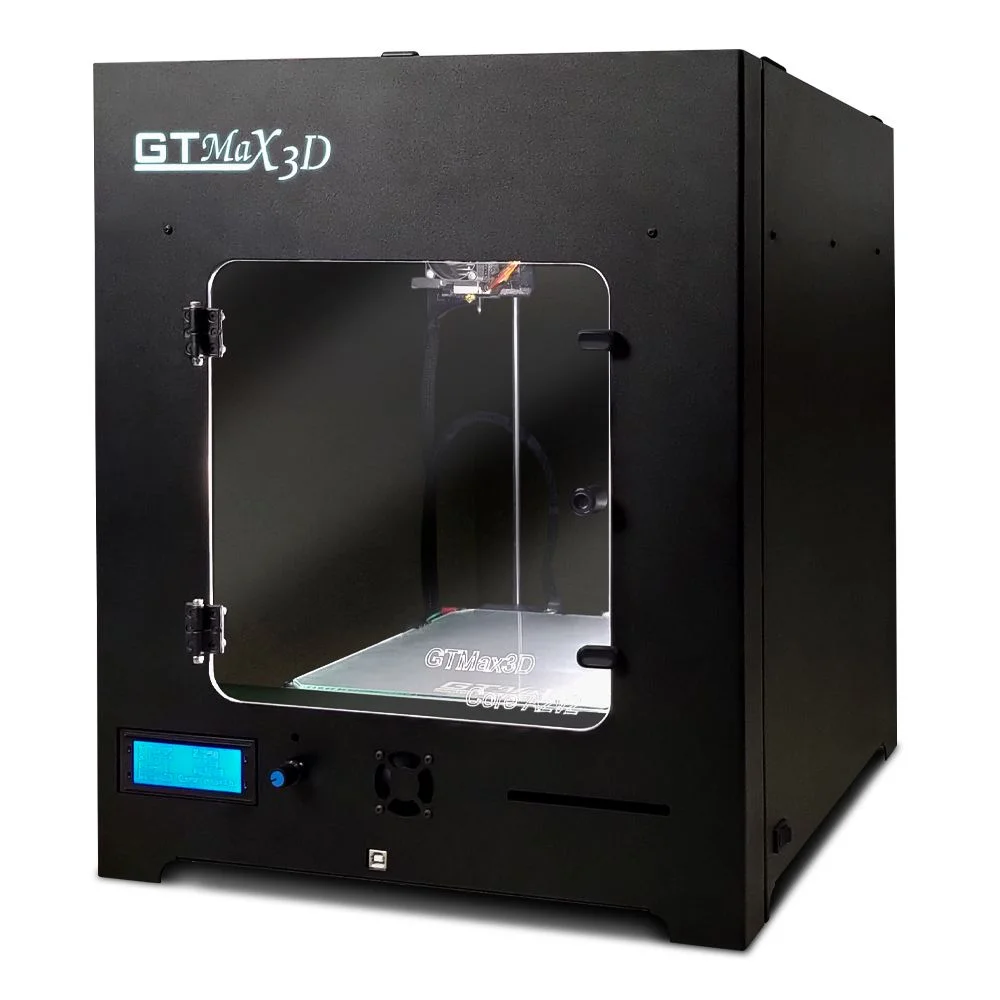Compare S5 vs Core A2V2
Comparison between the best 3D printers
Choose the best 3D printer at the best price. The cheapest 3D printers are here.
Buy a 3D printer here with 3D Fila.
 |
 |
|
| Model | S5 |
Core A2V2 |
| Printing Material | Filament | Filament |
| Buy Filament for Ultimaker S5 | Buy Filament forGTMax Core A2V2 | |
| Estimated price | $6950,00 | $684,00 |
| Manufacturer | Ultimaker | GTMax |
| Release Year | 2021 | 2019 |
| Print Volume [mm] | 330x340x300 | 220x220x240 |
| Printer Size [mm] | 495x585x780 | 425x460x512 |
| Weight [kg] | 20,6 | |
| Power Loss Recovery | YES | YES |
| Enclosed printer | YES | YES |
| Bed Leveling | Automatic | |
| Filament End Sensor | YES | YES |
| Bed type | Heated | Heated |
| Power supply system | Bowden | Bowden |
| Standard nozzle | 0,4 | 0,4 |
| Maximum Nozzle Temperature [°C] | 280 | 295 |
| Maximum Bed Temperature [°C] | 140 | 135 |
| Maximum printing speed [mm/s] | 80 | 150 |
| Filament holder | YES | YES |
| Camera for supervision | YES | YES |
| Recommended filaments | PLA, ABS, PETG, PC, Nylon, Tritan | PLA, PETG, Tritan, Flex, ABS |
| Recommended slicers | Cura | Cura, Simplify, Slic3r, IdeaMaker |
| Maximum Resolution [mm] | 0,1 | 0,05 |
| Processor | ||
| Display | Display touchscreen 4,7'' | Mono |
| Power Supply | 110/220V / 500W | |
| Connectivity | USB / Wi-Fi | SD / USB |
| Operating systems | Windows, Mac, Linux | Windows, Mac, Linux |
| Date of registration in the system | 2022-11-08 | 2022-11-12 |
| Release date | 2021 | 2019 |
| Extra features | The Ultimaker S5 stands out for its easy loading and unloading of materials, automatic bed leveling and excellent print quality with resolutions from 60 to 400 microns. It has dual extruders, interchangeable print cores, advanced connectivity with Wi-Fi and LAN, and intuitive software. It includes a Wi-Fi camera for monitoring, a removable glass bed, and a large build volume, making it ideal for professional and creative environments. | The GTMax3D ProCore A2v2 is a compact and robust 3D printer with a printing area of ??220 x 220 x 240 mm. It offers high print quality, ranging from 0.05 mm to 0.32 mm. Its features include automatic filament detection and changing, travel speed of up to 300 mm/s, and a heated aluminum bed with a glass top. It has automatic bed leveling with 16 points and an all-metal hotend that reaches up to 298°C. The printer has a carbon steel frame with electrostatic painting, is automatic bivolt and has connectivity via USB and SD card. The Bowden system and core xy kinematics complete its advanced features. |
| Support for multiple colors and materials (AMS and CFS) | NO | NO |
Notes * |
||
| Cost-benefit | 2 / 10 | 6 / 10 |
| Hardware | 3.6 / 10 | 2.5 / 10 |
| Tela | . | . |
| Print volume | 4 / 10 | 3 / 10 |
| Performance | 1 / 10 | 1 / 10 |
Conclusion |
| In comparing the Ultimaker S5 and the GTMax Core A2V2, it is clear that both printers cater to different segments of the 3D printing market, with significant differences in pricing, features, and intended applications. The Ultimaker S5, positioned as a premium option, offers substantial advantages for professionals and serious enthusiasts. With its impressive print volume, higher maximum resolution, and advanced connectivity features, it is designed for high-quality prints, ease of use, and versatility with a variety of materials. Its automatic bed leveling, dual extruders, and Wi-Fi monitoring enhance the user experience, making it a compelling choice for creative environments where print quality and reliability are critical. Conversely, the GTMax Core A2V2 is a budget-friendly model that, while lacking some of the advanced functionalities of the S5, still delivers solid performance for hobbyists and beginners. It features competitive print speeds, reliable automatic leveling, and a decent build size. With its lower price point, it provides greater accessibility for those looking to enter the 3D printing world without a heavy financial investment. Ultimately, the choice between these two printers revolves around the user's budget and specific needs. For those prioritizing high-quality output and advanced features, the Ultimaker S5 justifies its price with exceptional capabilities. Meanwhile, for users seeking a reliable entry-level option, the GTMax Core A2V2 offers a commendable balance of performance and affordability. The decision will largely depend on the user's intended applications—be it professional-grade or hobbyist projects. |

